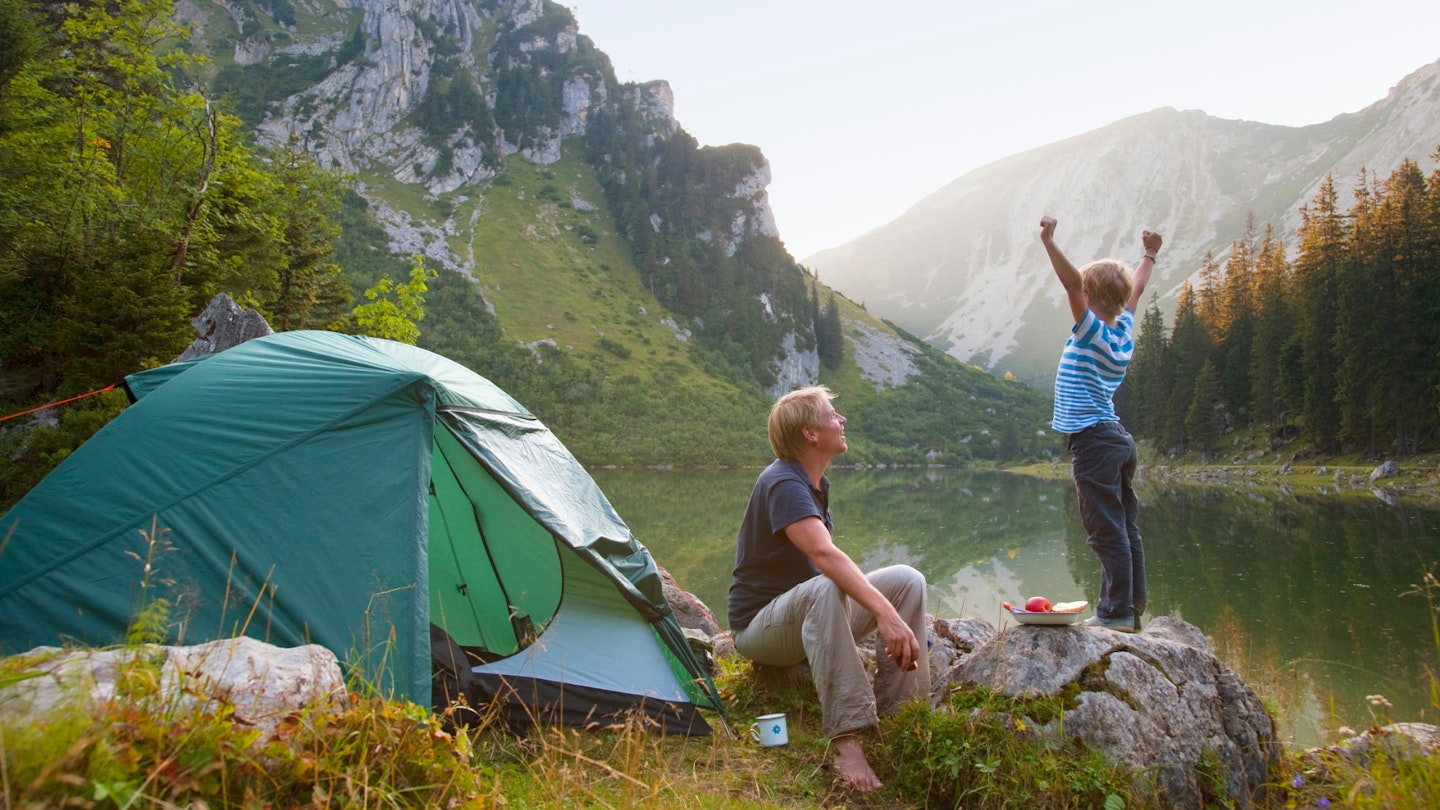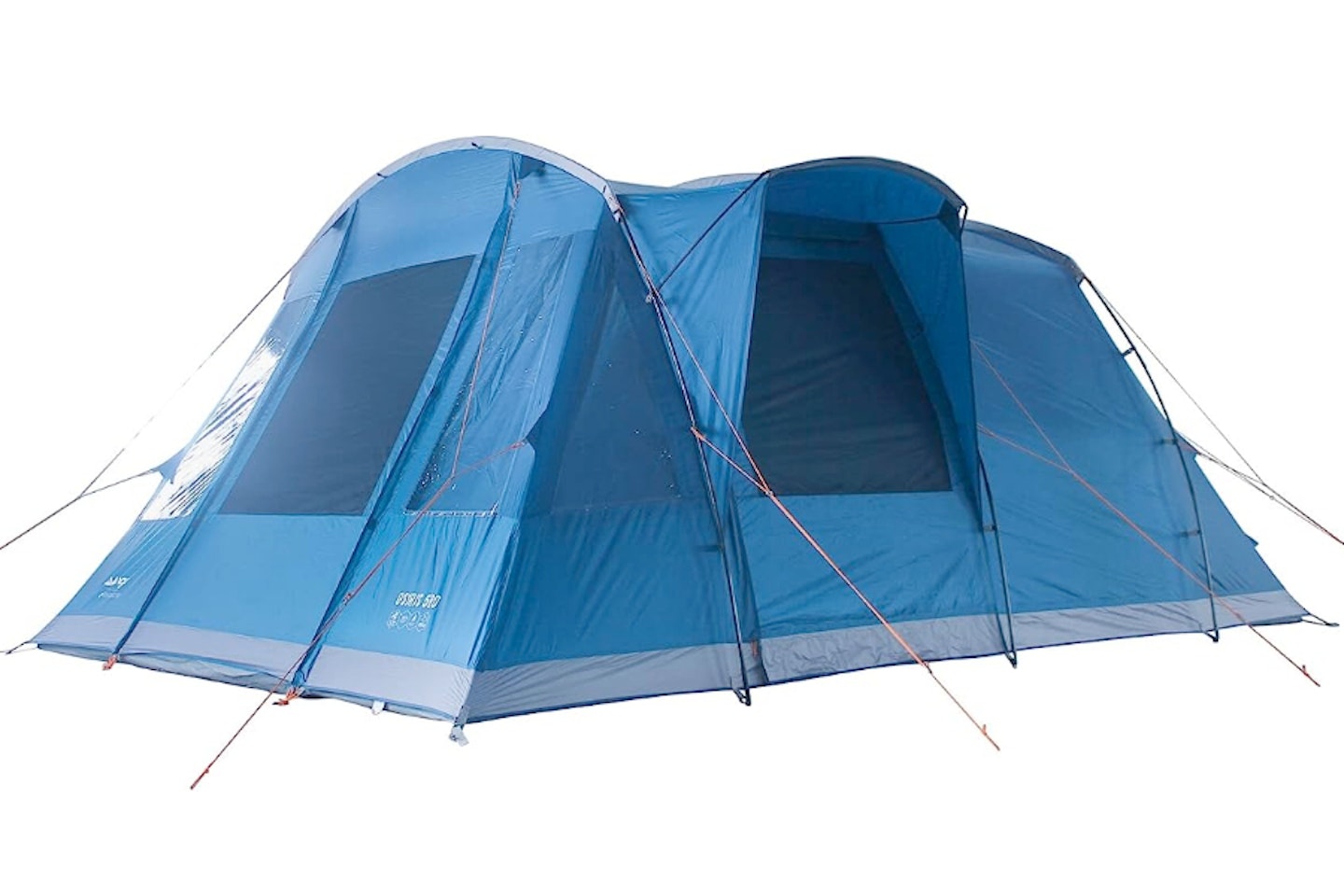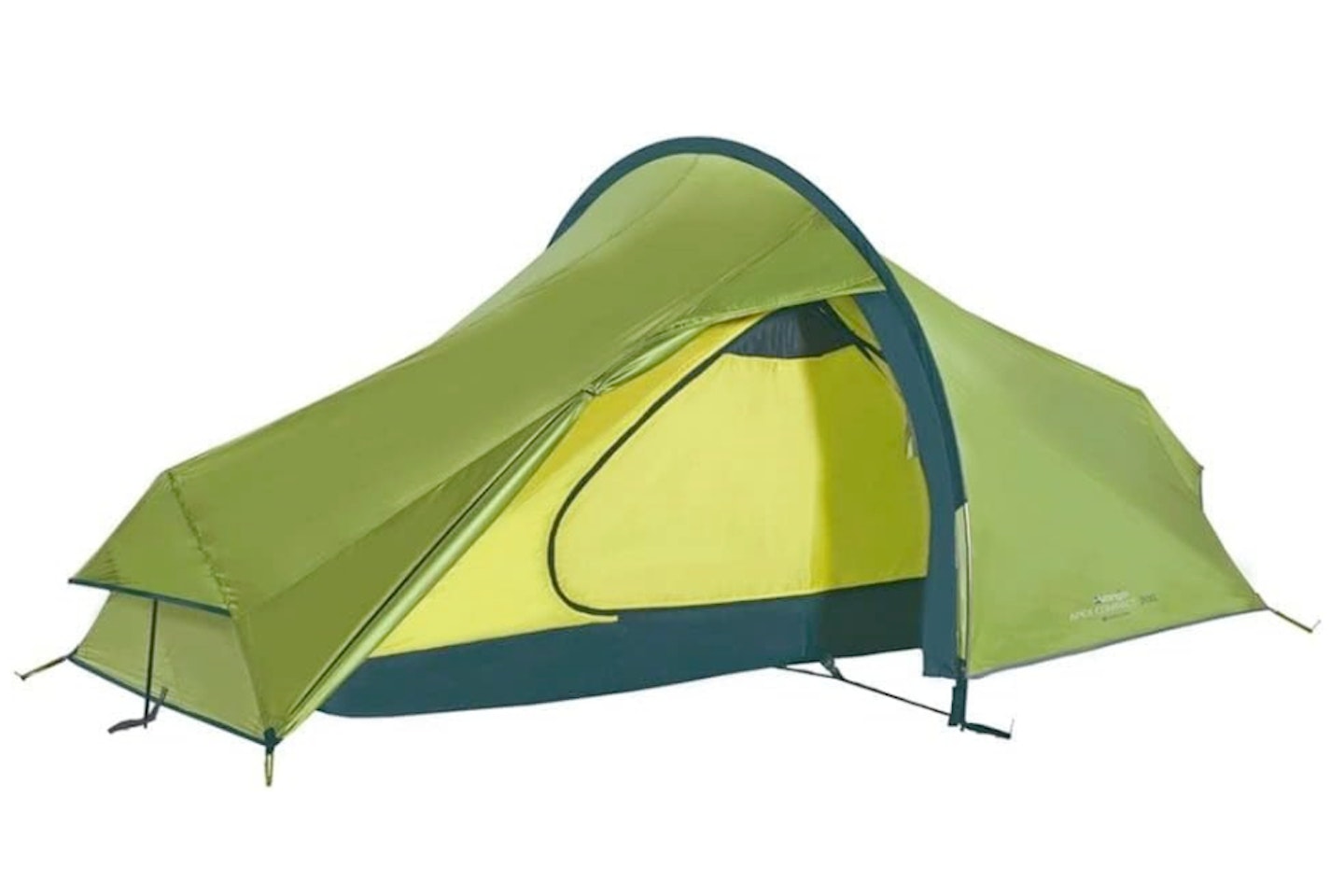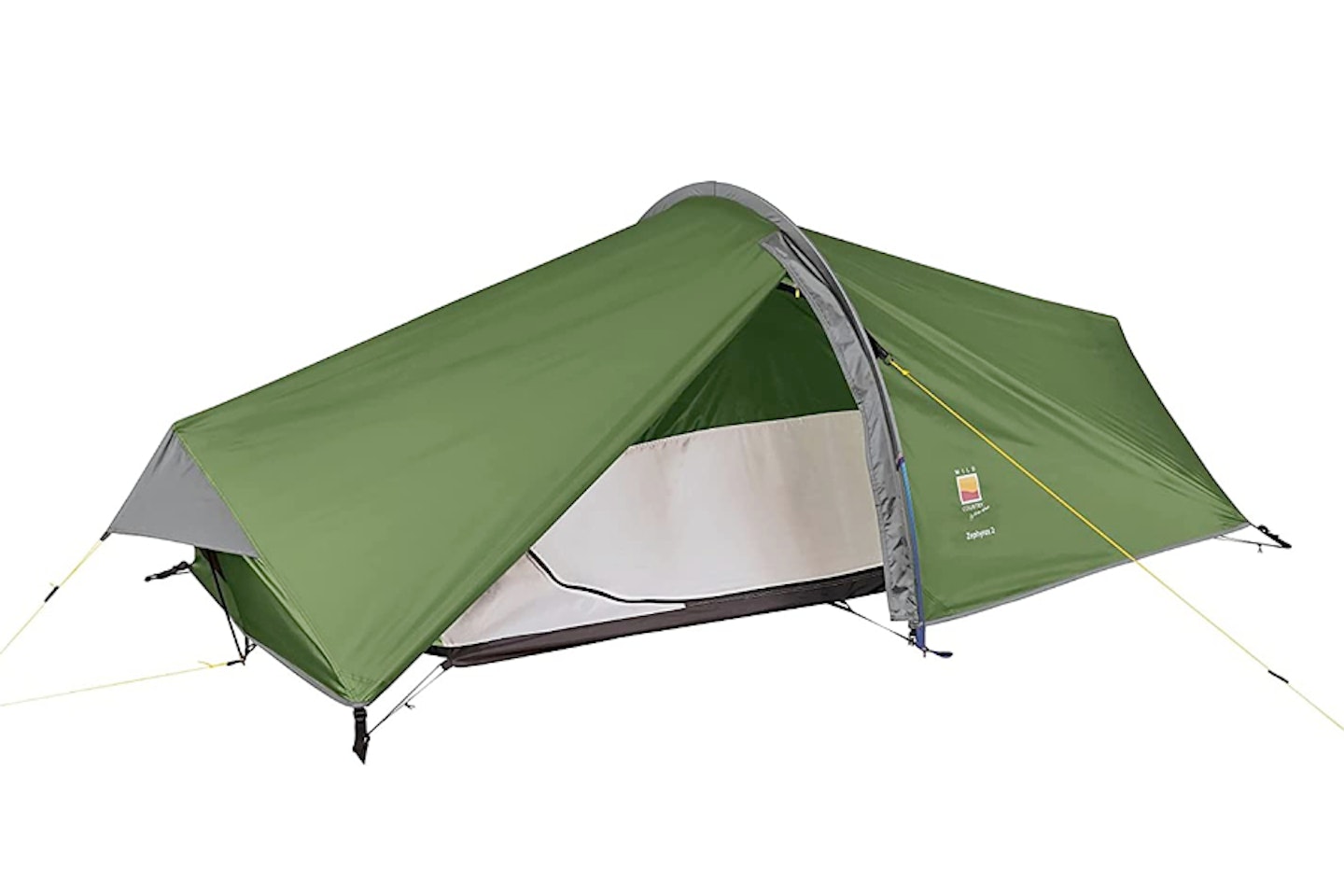For some, camping is a means to an end - a love of nature, hiking, and getting away from it all. For others, camping is the goal - the joy of pitching out a plot to call home, bringing friends and family together, spending long evenings around the firepit and falling asleep to the gentle patter of rain on canvas. Whatever the reason for camping, there’s one common denominator - the tent itself. And you want to ensure it’s a good one - that’s why we’ve pulled together a list of the best tents available in 2023.
Our list of tents, chosen by our camping and outdoors experts, is a diverse collection that reflects people’s various motivations for camping. Among some tried-and-tested picks, we have one, two and three-person tents - these fall into the remit of hikers, wild campers and backpackers.
The best tents for camping in 2025 at a glance:
• Best two-person tent: Berghaus Cheviot 2 - View on Blacks
• Best family tent: Vango Osiris 500 - View on Amazon
• Best festival tent: Coleman Darwin 2 - View on Amazon
• Best backpacking tent: Sierra Designs Meteor Lite 2P - View on Wildbounds
Moving on from these adventure-focused tents, we have more significant options suitable for family camping and traditional campsite holidays - we’re talking four, five and six people. These give you a lot more headroom and space to operate comfortably.
About our expertise
At What’s The Best, we’re big on getting outdoors. Among our team, we have pretty much every outdoor activity covered, from wild camping and hill walking, to kayaking, paddleboarding, climbing and mountain biking. Our team’s pursuit of adventure means that, yes, we spend a lot of our time in tents.
By combining our collective knowledge, experience and hands-on testing, we’ve made our choice of the best tents. We trust each of our picks implicitly - in fact, many of them feature in our own personal collections. That's because if we wouldn’t buy it ourselves, we don’t recommend it. Simple.
Please note: All prices are correct at the time of writing. Prices, stock and deals are subject to change without notice.
The best tents for camping in 2025
Best two-person tent
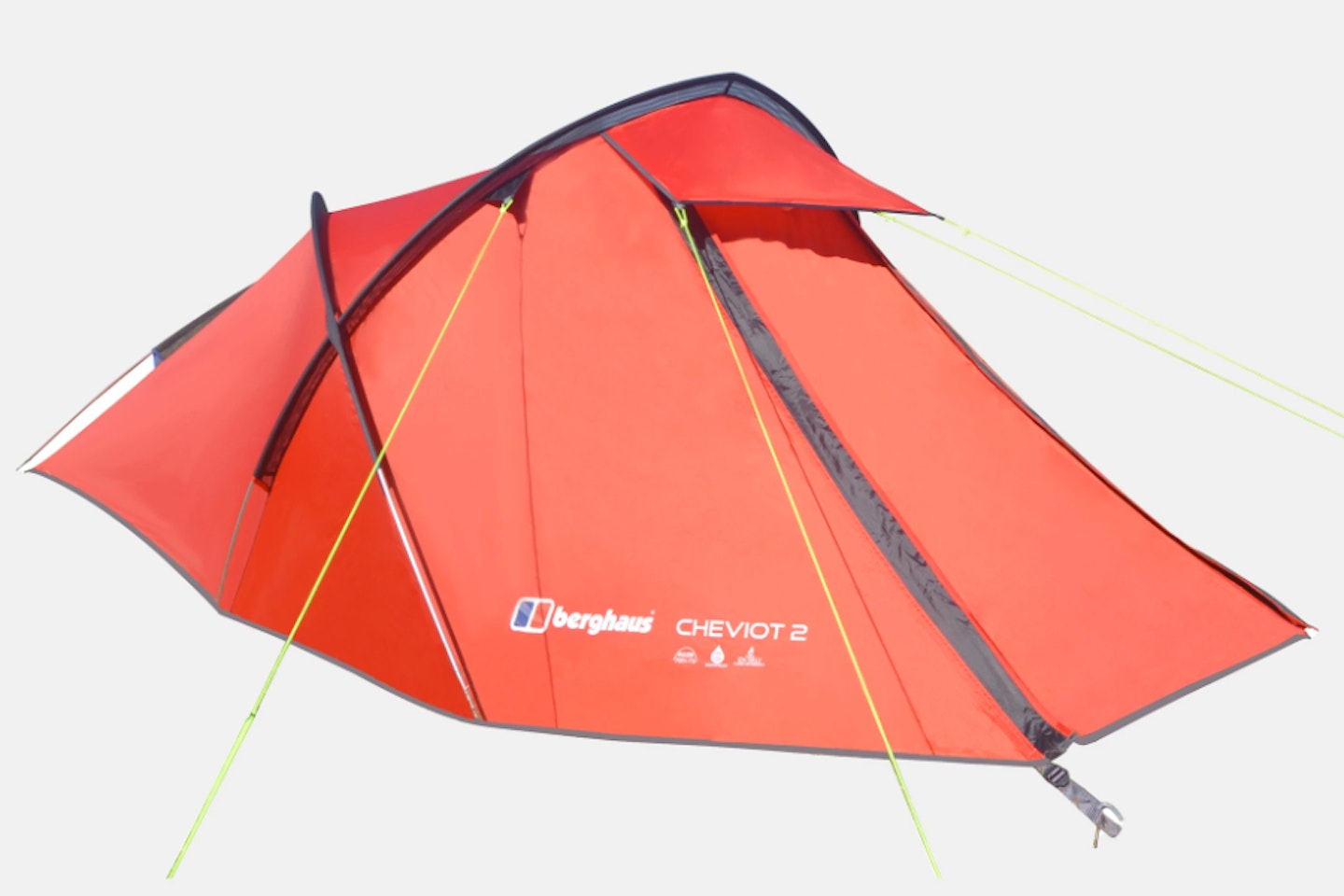
www.blacks.co.uk
The Berghaus Cheviot 2 is a reliable two-person tent designed for outdoor adventures. It has a high waterproof rating, needed for UK camping, and thanks to its semi-geodesic shape, it’s capable of dealing with stroppy windy weather, too. The trade-off is that because of the extra poles, pitching the Cheviot takes a couple of minutes longer than some options - but it’s worth it.
As a two-person tent, it’s spacious for one and snug for two - and note that because of its shape, it does narrow towards the rear, so you’ll likely want to sleep with your head by the door.
Pros
- Semi-geodesic design is strong
- Good shape to defend from wind
- Reliable waterproofing
Cons
- Lighter tents are available
| Total weight: | 3.05kg |
| Pack size: | 50 x 16cm |
| Fabric: | Polyester ripstop |
| HH rating: | 5000mm |
| Capacity: | Two person |
| Other features: | Tub-style groundsheet, semi-geodesic construction, alloy poles, mesh pole sleeves |
- “I took the Berghaus Cheviot 2 Tent wild camping on the beach in Scotland for a weekend to test how well it would fare against strong winds. Semi-geodesic tents provide additional stability when the weather is rough, and the Cheviot 2 proved effective and comfortable.
“The tent comes in a spacious bag, yet it is still lightweight and is no hassle to carry. There are extra pegs for securing an additional ground mat, and it is easy to manoeuvre if you want to move the tent to a different location. I recommend getting a ground mat as the tent’s base may need extra protection, especially when camping in unpredictable weather. Putting a tarp down will offer you more protection from the ground and save you from potentially waking up damp.
“Overall, I am very impressed with the Berghaus Cheviot 2. The value for money, fabric quality, design, lightness, easy assembly, and durability make it an excellent tent for hiking, wild camping, or casual use.” Tried and tested by Ellen Kinsey, Health & Fitness Writer for What’s the Best
Best festival tent
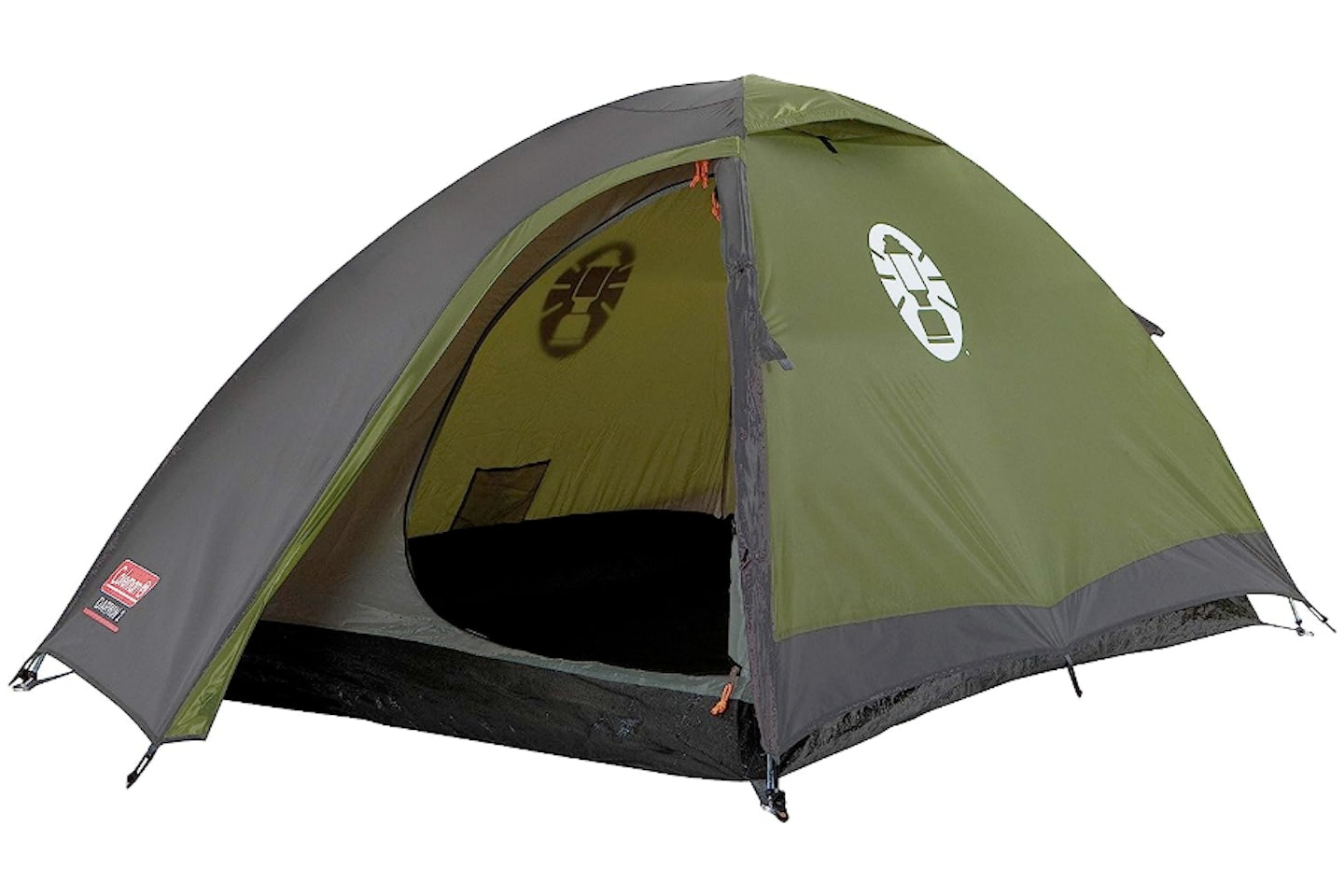
The Coleman Darwin 2 tent is a low-key and practical option for festival campers looking for value for money. With its well-made construction, it offers durability and reliability, plus it’s a doodle to pitch. Its higher waterproof rating provides peace of mind during unexpected rain showers, while SPF50+ sun protection ensures a safe and comfortable environment.
The Coleman Darwin 2 combines affordability, quality, and thoughtful features, making it an excellent option for festival-goers seeking a reliable and discreet shelter from the 24-hour party.
Pros
- Perfect for festivals
- No fuss design
- Good weather protection
Cons
- Not robust enough for dedicated campers
| Total weight: | 2.8kg |
| Pack size: | 46 x 15.5cm |
| Fabric: | WeatherTec™ |
| HH rating: | 3000mm |
| Capacity: | Two people |
| Other features: | Fully sewn-in groundsheet, fibreglass poles, inner storage pockets |
- Customer review: "Brilliant product, took this to download festival and took two of us 25 minutes to set up from unpackaging, reading instructions and fully assembling. It rained one of the days and we stayed dry. Top marks."
Best tent for families
The Vango Osiris 500 is, by tent standards, basically a mansion. The tunnel design tent maximises headroom and provides a spacious living area for relaxation and storage. This design also helps to create a stable structure that can withstand various weather conditions.
Constructed from durable and waterproof materials, the Osiris 500 ensures reliable protection from the elements. Its waterproof flysheet has a hydrostatic head rating of 3000mm, which can withstand heavy rain and keep the interior dry. The tent’s fully sewn-in groundsheet protects against moisture and insects, ensuring a comfortable and bug-free camping experience.
Ventilation is essential in any tent, and the Osiris 500 covers this by featuring multiple doors and windows, all equipped with mesh panels, allowing for excellent airflow while keeping bugs out. The tent’s vents also contribute to enhanced air circulation.
The Osiris 500 also includes practical features such as internal storage pockets, a lantern hanging point, and cable entry points for conveniently organising your gear and connecting electrical devices.
Note that this can be pitched by two, but three people make it very light work.
Pros
- Spacious
- Reliable against bad weather
- Lots of features to make life easier
Cons
- Pitching requires coordination
| Total weight: | 15.3kg |
| Pack size: | 73 x 34cm |
| Fabric: | Sentinel Eco Fabric |
| HH rating: | 3000mm |
| Capacity: | Five person |
| Other features: | Vango PowerFlex® Fibreglass Poles, fully sewn-in waterproof PE groundsheet, drop down door step, tension band system, multiple mesh doors, covered side door, pockets, inner divider, Queen nightfall bedrooms, lantern hanging points, electrical hook-up passthrough pints, Vango AirZone high and low level ventilation, taped seams |
- “I own a one-person and two-person tent, as well as this five-person Vango Osiris. Each serves a purpose, and the Osiris’ purpose for me is to give myself and my partner a tonne of operating space when camping for a week or so. It gets a big tick in that box - with ample living space up front and many windows for natural light. The sleeping compartment, split in two with a removable material sheet, has plenty of room for cot beds and luggage storage.
“I was surprised at how well the Osiris put up with terrible weather. I took my Osiris for a spin on a week-long trip to the Peak District. In late October. On a hill. One day, the weather was particularly ferocious, with high winds and driving rain.
“We chose to decamp to the pub until it all blew over, resigned to the chance of returning to a leaking, semi-collapsed tent. My lack of confidence was partly due to my long experience with smaller geodesic tents, which feel sturdy as a brick outhouse.
“Thankfully, the Osiris proved my prejudice wrong, and in grand style - the tent stood firm, pitched as tightly as we left it, and dry as a bone inside. In fact, it was in a better state than we were by some margin - though that may have had more to do with the local ales than the local weather.
“Without question, I recommend the Vango Osiris 500. I’ve even had the pleasure of testing the air-beam version - this is also a great tent, but I prefer the extra headroom provided by traditional poles.” Tried and tested by William Lobley, Deputy Tech & Fitness Editor for What’s The Best
Best one-person tent
The Vango Apex 100 is an exceptional one-person tent. With a price often below its £150 RRP and weighing under 2kg, it’s light on your wallet and in your backpack. Adhering to the tunnel tent design, it offers ample space for its size, which allows you to sit upright in the middle. The porch is a standout feature for us, providing extra utility and protection.
Pitching is a breeze thanks to the 70D flysheet, and with a 3,000HH rating, it handles downpours effectively. The Apex 100 comes in a compact bag, perfect for quick camp breakdowns and even bikepacking, as it can be attached to handlebars. Vango wins bonus points for its recycled materials, including 20+ water bottles.
Pros
- Affordable and reliable
- Easy to pitch and light to carry
- Recycled materials used in construction
Cons
- Expandable anchor points are slippery - will need to be pitched at full length
| Total weight: | 1.88kg |
| Pack size: | 30 x 15cm |
| Fabric: | Protex Eco |
| HH rating: | 3000mm |
| Capacity: | One person |
| Other features: | DofE recommended kit, fast pack tent bag, part mesh inner door, PowerLite 7001-T6 Alloy Poles, inner pocket, hi-vis gulines, taped seams |
- Customer review: "Very pleased with our tent. High quality and lightweight. Would highly recommend."
Best two-person wild camping tent
We had a great time testing the Wild Country Zephyros Compact 2. It excels in weight and portability, making it an ideal choice for two-person wild camping, backpacking and hiking trips. It’s constructed with durable materials that withstand various weather conditions, including rain and wind, thanks to the 4000HH.
The tent’s design is intuitive and straightforward, allowing for easy setup and takedown. It offers sufficient space for two people, with a vestibule area for storing gear. We must commend the tent’s ventilation system, which helps prevent condensation build-up inside - a much more significant problem when two bodies breathe.
While the Zephyros Compact 2 delivers on its promises of lightweight performance and durability, the tent has limited headroom and floor space that may be restrictive for taller individuals or those with more gear.
Overall, we highly recommend the Wild Country Zephyros Compact 2 for outdoor enthusiasts looking for a lightweight, portable, and reliable tent.
Pros
- Basic but well-made
- Light and compact
- Easy pitching
Cons
- Small porch
- Not freestanding
| Total weight: | 1.95kg |
| Pack size: | 30 x 19cm |
| Fabric: | Stormtex P4000, Aquastop P5000 groundsheet |
| HH rating: | 4000mm |
| Capacity: | Two people |
| Other features: | Quick and easy to pitch with the inner and flysheet pitched together, condensation is managed with a mesh panel in the top half of the inner door and at the end of the tent, two doors and one porch |
- "Overall, I am very impressed with the Zephyros Compact 2. The value for money, quality of construction, lightness, ease of pitching, and performance make for a superb hiking tent. The primary niggle lies in the lack of porch space.
"For those after a well-rounded hiking tent for most scenarios, the Zephyros Compact 2 is definitely recommended by us." Tried and tested by Chris Williams, contibutor and outdoors expert.
Best three-person tent
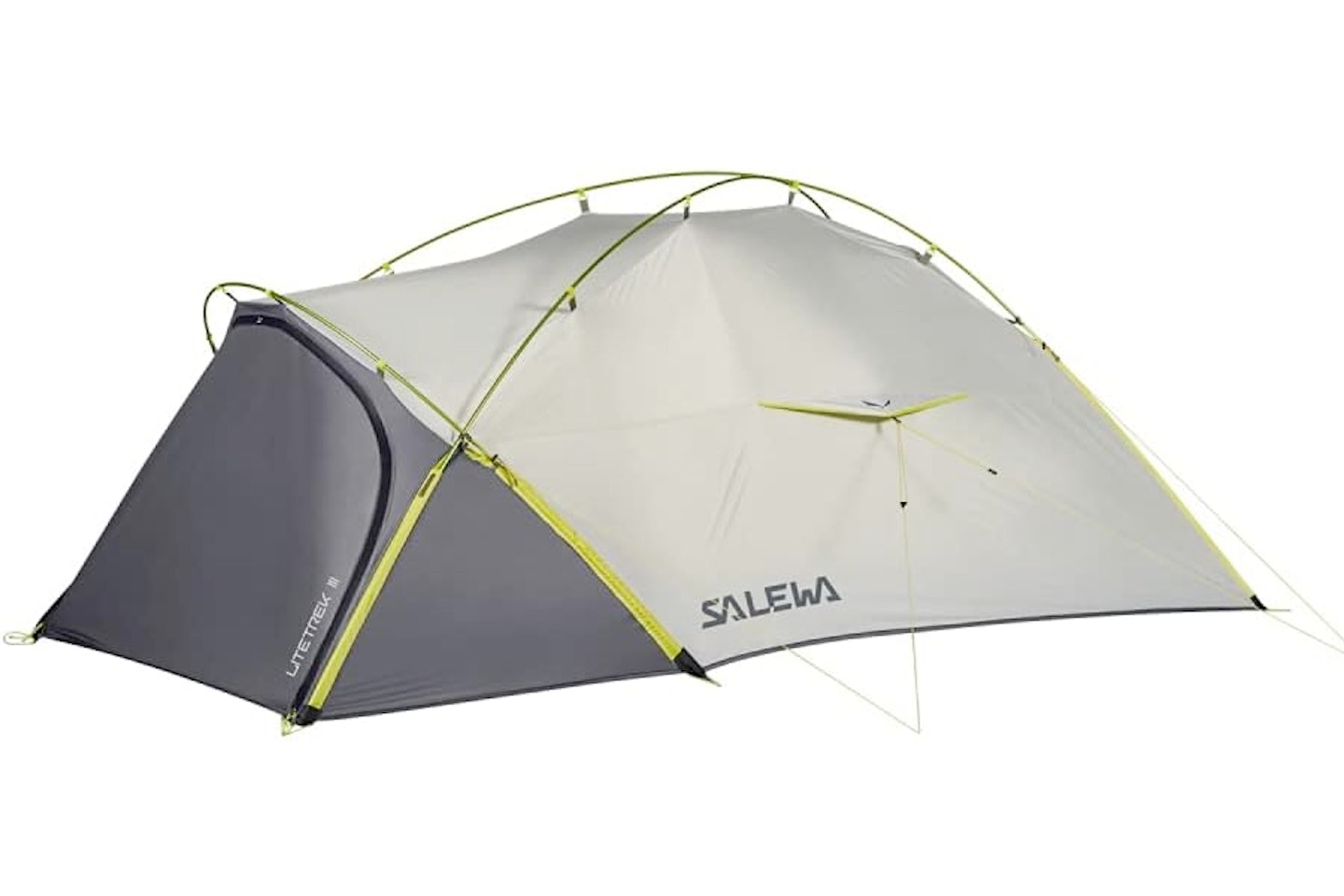
The Salewa Litetrek Pro III tent is a top-quality shelter designed for backpacking and trekking adventures. This lightweight and compact three-person tent offers excellent weather protection and durability. Its double-wall construction with a ripstop nylon flysheet and a waterproof floor ensures reliability in challenging conditions.
Quick and easy to pitch, the Litetrek Pro III is a reliable choice for outdoor enthusiasts seeking a lightweight and dependable shelter for their expeditions. We like how the construction is freestanding, which makes pitching in the rain faster and easier. If the weather isn’t great, the porch is a good size for gear and cooking. To top it off, the geodesic shape is very stable, even without the guy lines.
Pros
- Robust against wind and rain
- Really light for its size
- Useable porch area
Cons
- Expensive for only occasional use
| Total weight: | 2.42kg |
| Pack size: | 40 x 19cm |
| Fabric: | 20D ripstop nylon flysheet with silicone and PU coating |
| HH rating: | 3000mm |
| Capacity: | Three person |
| Other features: | Door storage pockets, anti-catch zipper, extendable anchor points, reinforced hypalon sleeves, self-supporting construction, extended guyline webbing |
- Customer review:"Absolutely fantastic tent. After a few times it can be up in less than five minutes."
Best backpacking tent
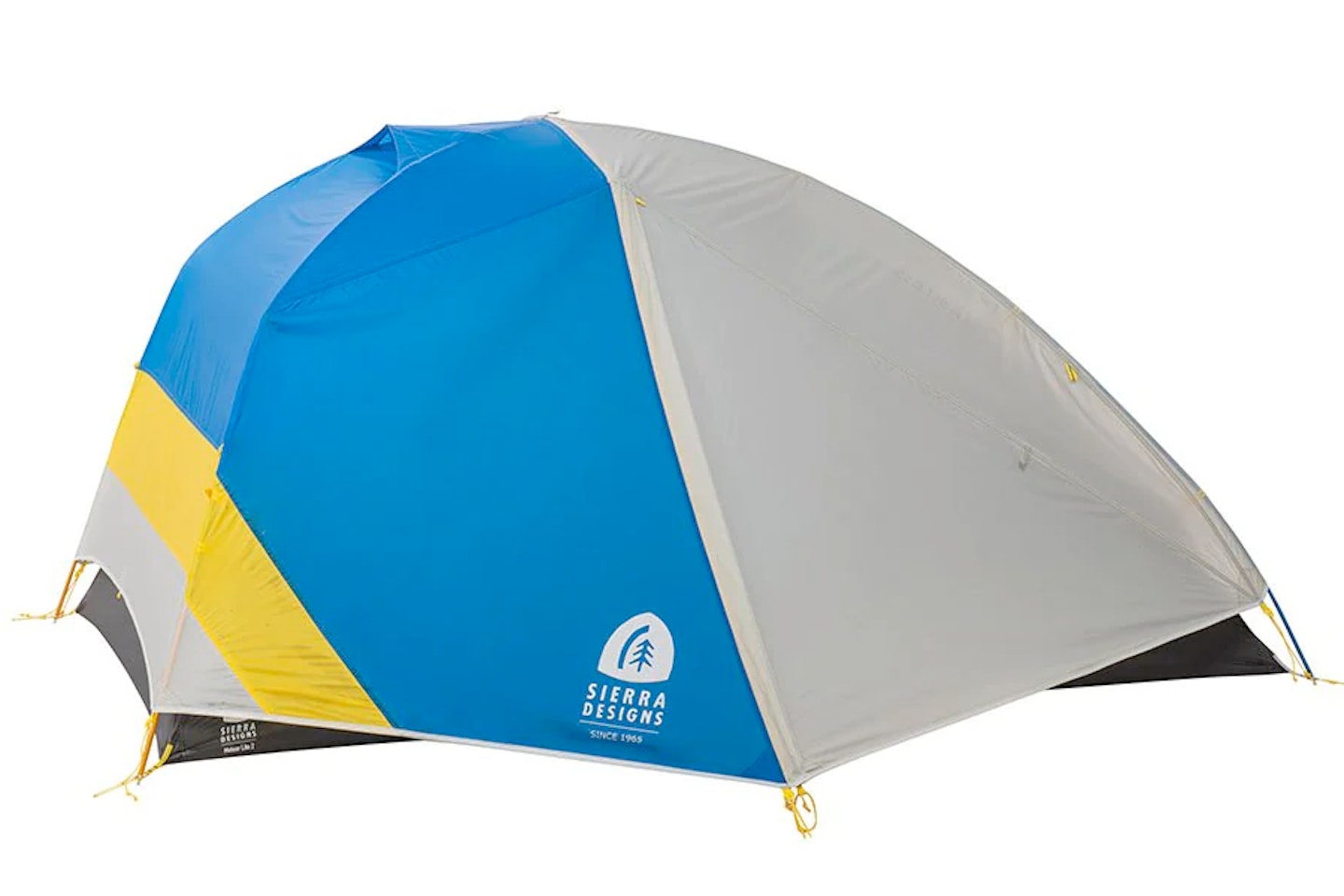
wildbounds.com
The Sierra Designs Meteor Lite 2 is perfect for a versatile backpacking tent because it focuses on efficiency and ease of use. Its freestanding nature allows for convenient setup and repositioning, making it ideal for various camping conditions. The tent’s lightweight construction and compact pack size are perfect for carrying on multi-day walks and national routes or having in a backpack for train and plane travel. The 1800mm HH might seem low, but the fabric treatment means that it punches above its weight.
Its full-mesh inner tent ensures exceptional ventilation, further enhanced with the rollable flysheet. Smartly, Sierra Designs has incorporated a pre-bent pole design which allows for a nice amount of headroom. It is that simple, but in this simplicity, you’ll find the excellence and precision required by the dedicated backpacker.
Pros
- Freestanding design
- Robust - suitable for mountaineering
- Very light and small-packed
Cons
- Expensive for newcomers or infrequent use
| Total weight: | 1.63kg |
| Pack size: | n/a |
| Fabric: | n/a |
| HH rating: | 1800mm |
| Capacity: | Two people |
| Other features: | Fully freestanding for versatile pitch and ease of use, coverage fly with rollback stargazer feature for ventilation and night sky views, 2-door 2-vestibule design for ease of use and gear storage, hubbed pole structure with ridge pole to make vertical sidewalls |
- Customer review: "Fantastic tent. its super easy to pitch, feels sturdy. Feature wise its got everything I need for three seasons. No condensation issues. The part solid inner does a great job isolating you from the cold. Not pitched it in any challenging conditions, but before I bought it seen its stood to some well. Just note the top vent mustn't be directed at driving rain when opened."
Best four-person tent
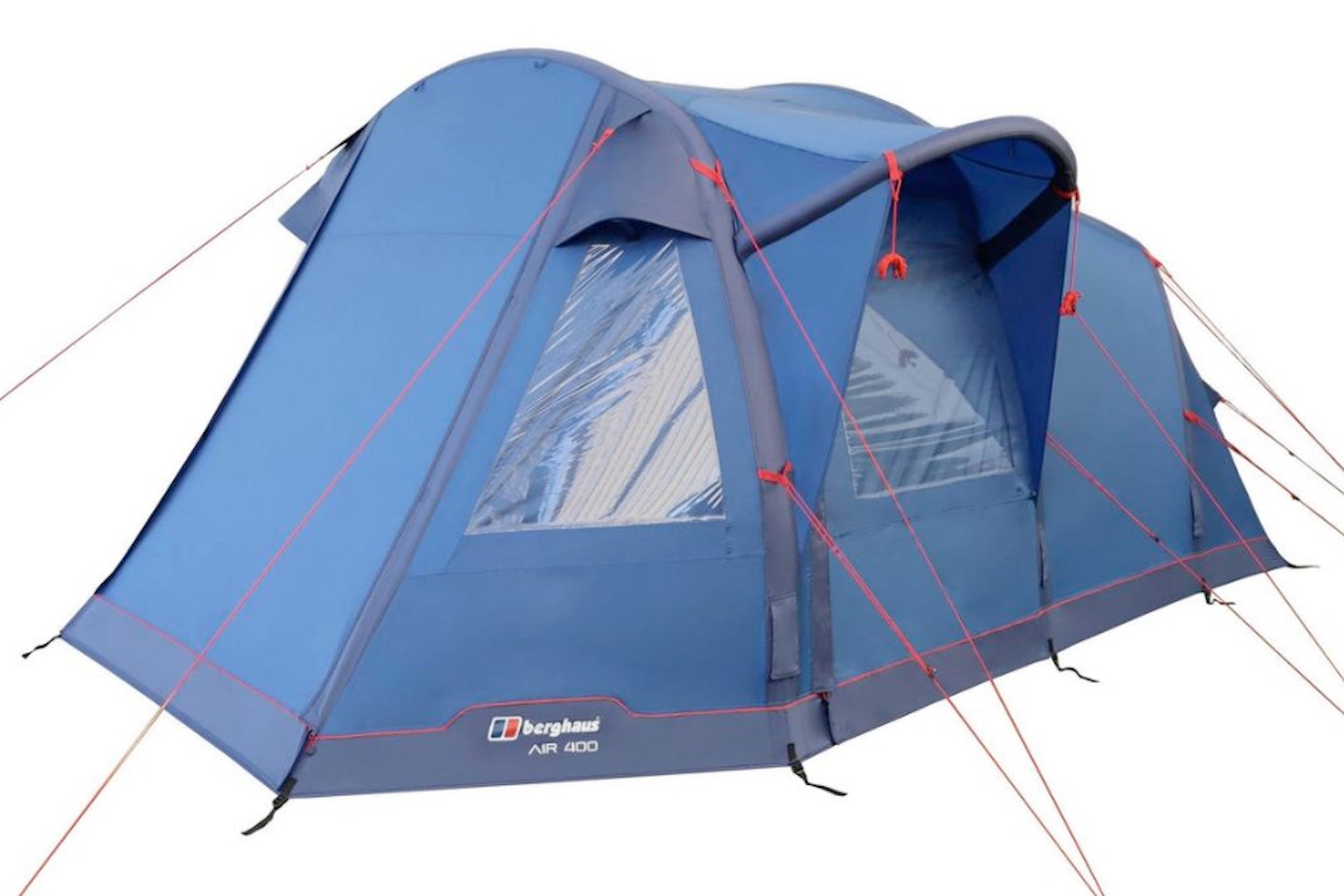
www.tiso.com
Perfect as a base of operations for a hiking holiday or a relaxed home for a small family week away, the Berghaus Air 400 is a delightful four-person tent. With its Quick-inflation technology, which replaces traditional pole supports, the Air 400 can be set up in minutes using the included air pump.
The Nightfall technology in the fabric reduces sunlight, providing a darker interior for better sleep quality - ideal for summer camping where the sun is prone to rise at very unsociable hours. The tent features multiple doors and windows for ventilation and easy access. Its durable and waterproof construction - an impressive 6000mm HH - ensures protection from the elements.
Handy note on portability - the bag is wheeled.
Pros
- Quick to pitch
- Super-dark bedrooms for easy sleeping
- Good ventilation and strong waterproofing
Cons
- Air poles add to the weight
| Total weight: | 20.5kg |
| Pack size: | n/a |
| Fabric: | n/a |
| HH rating: | 5000mm |
| Capacity: | Four person |
| Other features: | Improved angled beams provide 20% extra living space, Nightfall® blackout technology – removable darkened bedrooms, quick-release air valves, high and low vents, side door, Berghaus Air Porch compatible, Fly sheet and groundsheet fully seam taped, groundsheet sewn in, Breathable polyester inner, Large organisers below windows and multiple pocket organisers in living area, extra large windows |
- Customer review: "My wife and I purchased this tent as we needed to upgrade from a crummy second hand tent and we purchased this as I'm keen on Berghaus. The tent is very quick and easy to pitch up and is a very clever design. It looks great too! It's up in seconds then the easy job of pegging in the guides.
- "It's a very spacious tent. I'm 6 feet 7 and my wife is 6 feet 1 and we can stand up in it. No more stooping and getting back ache. We had a wet night on our third night near Hay on Wye on its first trip and it handled it perfectly with no leaks. Such a pleasant camping experience and we are looking forward to its next outing"
Best large family tent
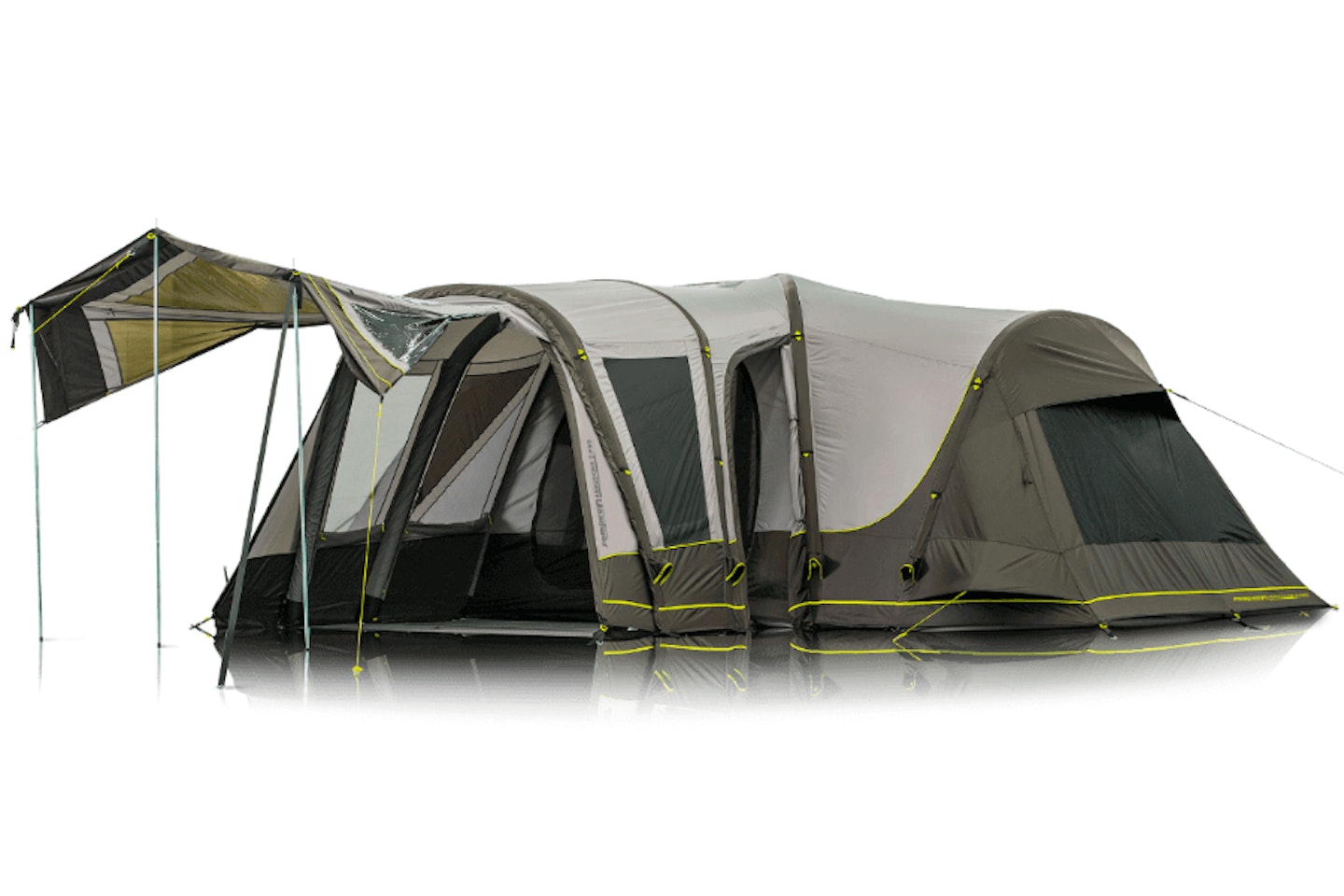
www.gooutdoors.co.uk
The Zempire Aerodome II Pro is a premium tent all about attention to detail and quality. Oh, and oodles of space, of course. With its tunnel design and impressive size, this tent can comfortably accommodate up to six people, making it ideal for families or groups.
Designed in a T-shape, you benefit from two living areas - a more social, public front room and a more private space. Flanking the rear living room (featuring skylights) are the two bedrooms - a large main bedroom and a slightly smaller bedroom with a storage cupboard.
It uses inflatable air beams to promote quick pitching, aided by the included dual-action. The robustness of the air beam construction ensures stability and reliability in various weather conditions, which is a welcome bonus.
The fabric used in the tent’s construction is durable and waterproof, with a high 10,000mm hydrostatic head rating (the highest on this list), ensuring protection from rain and storms. The taped seams further enhance weather resistance. The tent includes a fully sewn-in groundsheet, protecting against bugs, dirt, and moisture.
Additional features of the Aerodrome II Pro include multiple internal storage pockets, a cable entry point for electrical connectivity, and the option to attach a separate bedroom pod.
Pros
- Huge living space
- Excellent quality throughout
- Very high waterproofing
Cons
- Large to store
- Weighs over 40kg
| Total weight: | 43.4kg |
| Pack size: | 82 x 60 x 50cm |
| Fabric: | 210D, 130T poly oxford with 420D ripstop grid, UPF 100 |
| HH rating: | 10,000mm |
| Capacity: | Six people |
| Other features: | Dome design with air poles, durable sewn-in groundsheet, 15 ventilation points, tinted skylight, central living areas, side openings, 3-way windows, integrated storage, extended gullwing awning. |
- Customer review: "Simply the best tent I've ever owned. It's big but the lack of poles means it fits into our roofbox easily. The attention to detail in the way it's been designed is outstanding, from the tensioners to the pockets where you can stow open doors - a simple feature but it removes the hassle of rolling and tying up the doors - and stacks of ventilation meaning it's easy to get a breeze flowing throughout the tent. Takes literally minutes to erect and even less time to take down and comes with seriously heavy duty straps. Superb!"
What should I consider when buying a tent?
Whether you are new to tents and camping and looking for a buyer’s guide, or a experienced at pitching a tent for wild camping, you must take a moment to consider what you need from a tent before purchasing. Here’s what you should be thinking about before heading into our list of the best tents:
Tent capacity: How many people do you want the tent to accommodate? A tent’s capacity is measured in people - one-person, two-person, three-person and so on - and represents the maximum sleeping space. If you want a little more space, it’s always a good idea to pick a tent that one over your sleeping needs, unless you are backpacking or wild camping, in which case compactness and lightness take priority.
Seasonality: Most tents are three-season for use during spring, summer and autumn - when most people camp. However, for winter camping, there are four-season tents available. Four-season tents are very sturdy and intense weather - they also are considered specialist equipment and have a high price tag.
Waterproofing: Waterproofing is crucial to keep you dry during rain showers or wet conditions. Look for tents with a high waterproof rating for better protection - how robust a tent’s waterproofing is is measured as a hydrostatic head, or HH.
1,500mm is a basic level of water resistance, while 3,000mm is suitable for heavy rains. Some tents reach an impressive 10,000mm water resistance. You can read more about HH ratings below.
Features like a bathtub-style floor, taped seams, and a rainfly extending over the tent can enhance waterproofing.
Durability: Durability refers to how tough a tent’s materials are. Look for robust fabrics with ripstop features that prevent tears from opening up and good abrasion resistance to defend against friction on rocks and wood.
Weight and size: We’re talking here about the weight and size of a tent when packed. If you’re wild camping and backpacking, getting a compact, lightweight tent - under 2kg - is a must. If you’re travelling to your camp by car, you can afford to get a heavier, larger tent.
Weight and size will also dictate how you carry and store a tent - for example, if you want a six-person tent, do you have room for a massive 40kg bag in your home?
Additional features: We also recommend thinking about ventilation to prevent condensation, how easy a tent is to pitch, whether there are vestibules, porches and pockets, how many doors and, of course, budget.
Tent HH explained
HH stands for “Hydrostatic Head”. It’s a measurement used to determine the waterproofing capability of fabric, including tent materials. It represents the amount of water pressure the fabric can withstand before water penetrates it. The higher the HH rating, the more water-resistant the fabric is. It's something you will need to pay close attention to when looking through our list of the best tents.
The HH rating is typically measured in millimetres (mm) and indicates the height of a column of water that the fabric can support before it leaks. For example, a tent with a HH rating of 2,000mm means that the material can withstand a 2,000mm (or 2-metre) column of water without leaking.
• 800mm to 1,500mm: Basic water resistance. Suitable for light rain and mild weather conditions. It may not be sufficient for heavy or prolonged rainfall.
• 1,500mm to 2,500mm: Good water resistance. Provides reliable protection against moderate rain showers and average weather conditions.
• 2,500mm to 4,000mm: Excellent water resistance. Suitable for heavy rain and more challenging weather conditions. It offers increased protection and reliability.
• 4,000mm and above Excellent water resistance. Ideal for extreme weather conditions, including heavy downpours and prolonged rainfall. Provides a high level of protection against water penetration.
It’s important to note that the HH rating is not the only factor determining a tent’s waterproofing capability. Other factors, such as material treatments, seam sealing, quality of zippers, and design features, also contribute to the overall water resistance of a tent.
When choosing a tent, consider the typical weather conditions you may encounter during your camping trips. A higher HH rating is generally recommended for wild camping or camping in areas prone to heavy rainfall. However, remember that higher HH ratings may also result in slightly heavier tent fabrics.
To ensure you are using the HH rating entirely, you must set up your tent to maximise its waterproofing performance properly.
A buyer's huide to tents: Your questions answered
What is a vestibule in a tent?
A vestibule is an enclosed area typically located outside the main sleeping area. It provides extra space for storing gear, muddy boots, or cooking in poor weather, keeping the main tent clean and organised. It’s sometimes called a porch.
The vestibule is likely to be snug in one-person and two-person tents. However, larger family tent vestibules are much more considerable in size.
How important is ventilation in a tent?
Ventilation is crucial to reduce condensation inside the tent. Condensation from our breathing is often why the inside of a tent feels damp after a night’s sleep, rather than rain leaking in. Ensuring air is free to move in and out of the tent is essential for condensation to a minimum.
Look for tents with mesh panels, vents, or windows that allow airflow while keeping insects out. Tents often have a small velcro-tipped pole or support to help the flap above vents stay open while protecting them from rain.
Are there tents suitable for different seasons?
Four-season tents withstand extreme weather conditions, including snow and strong winds. Three-season tents are suitable for spring, summer, and fall but may not handle heavy snow loads.
What are the advantages of a freestanding tent?
Freestanding tents are self-supporting, meaning they don’t require pegging or guyline tension to stand up. They offer greater flexibility in choosing the camping location, making setup and takedown faster. They are a good choice for wild campers.
Can tents be repaired if they get damaged?
Many tents come with repair kits, and minor issues like small tears or broken poles can often be fixed. Learning basic repair techniques or consulting professionals for major repairs is a good idea.
How should I care for my tent?
Proper care includes:
• Storing it clean and dry.
• Avoiding direct sunlight when possible.
• Regularly inspecting for any signs of damage.
Follow the manufacturer’s instructions for cleaning and maintenance.
Can I use a tent in extreme weather conditions?
While tents can withstand various conditions, choosing the appropriate tent for the weather you expect is essential. Proper pegs and guylines and reinforcing the tent can improve stability in harsh conditions.
